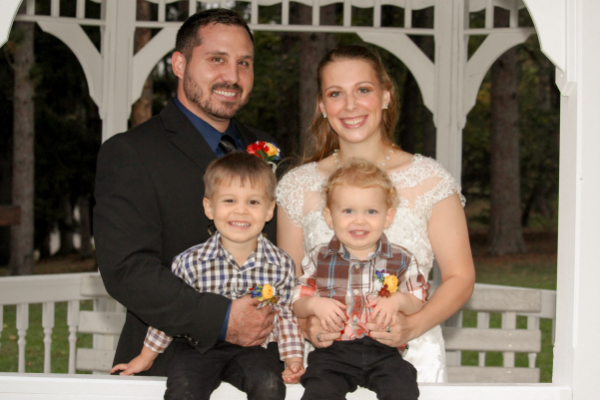A Life of Service: Veteran Turns to Career in Nursing

RN to BSN student Jesse Glass has devoted his life to helping others. He served in the Marine Corps for four years after high school, deploying twice to Iraq, and now works as a nurse at a correctional facility in Mansfield.
This husband and father of two is currently furthering his education online through Ohio State's Bachelor of Science in Nursing program, using the GI Bill. Glass took time to talk with us about how he balances school, life, family and career.
Q: Tell us a little bit more about your background and about yourself.
A: I grew up in a rural area. I joined the Marine Corps in 2006 and was deployed twice to Iraq. After my contract ended, I wanted to get out and go to school, but I didn't know what I wanted to do. There seemed to be a lot of opportunities and stability with nursing and careers that involve helping other people. Seeing those environments and combat zones while I was deployed opened my eyes up to humanity and how there is so much good we can do.
 I decided to go Marion Technical College for nursing in 2010 and did pre-requisites there for two years. I graduated with my associate degree in 2014. I then started the RN to BSN program at Ohio State last August.
I decided to go Marion Technical College for nursing in 2010 and did pre-requisites there for two years. I graduated with my associate degree in 2014. I then started the RN to BSN program at Ohio State last August.
I've been married for nine years and met my wife at her first semester of nursing school at Marion Tech. She's now a stay-at-home mom for our two boys, while I work for the Ohio Department of Rehabilitation and Correction in Mansfield. In my free time, I like bringing my boys outside and exploring the outdoors.
"Seeing those environments and combat zones while I was deployed opened my eyes up to humanity and how there is so much good we can do."
Q: How do you manage to balance your busy schedule?
A: I work second shift, which some people don't find ideal, but it works for me. I'll spend the morning with my family and then head to work from 1:45 - 9:45 p.m. After work, I'll do my schoolwork until 2 or 3 a.m.
Q: What is it like working as a nurse in a correctional facility?
A: At the prison, there's a lot of mental health resources needed. I'm not a mental health nurse, but I do chronic care and acute care work. If there's a fight or someone gets injured, they triage them. If a doctor isn't there, it's up to me to determine the measures to take. Working in chronic care, I track things like blood pressure, follow-ups and getting the prisoners appointments when needed.

Q: What is your favorite part of your job as a correctional facility nurse?
A: I like to help the prisoners medically and promote a good atmosphere for them. My favorite part of my job is being able to let the prisoners know that I understand they've made mistakes in their past, but that they're not bad people. I enjoy encouraging them to change their environment when they get out and to not go back to their same past surroundings; reminding them that they can pick and choose their battles. I try to mentor them and really help them in that regard.
Q: How has the RN to BSN program benefited you so far? Was there anything specific about the program that stood out to you?
A: The RN to BSN program allowed me to understand the overall picture that everything is integrated in healthcare. Whether it’s collaborative healthcare or interdisciplinary, we are all working together as one for the patient. I noticed that a lot of other programs are only focused on applied nursing. With Ohio State's RN to BSN program, it’s more of a leadership approach to learning. This helps me and other students open our minds to how we can be leaders in healthcare.
"With Ohio State's RN to BSN program, it’s more of a leadership approach to learning. This helps me and other students open our minds to how we can be leaders in healthcare."
Q: What are your goals for the future?
A: I want to be a family nurse practitioner or a mental health practitioner. I recently talked to Dean Melnyk who told me about a dual program which I am interested in pursuing. As a family nurse practitioner, I would be able to help so many different people and a variety of issues and apply the science to it. I've noticed that it's sometimes hard to see the progress you're making as a nurse, but as a family nurse practitioner, you are able to better indicate the progress. You see the issue, and you're then able to help; seeing that progress is really motivating.
